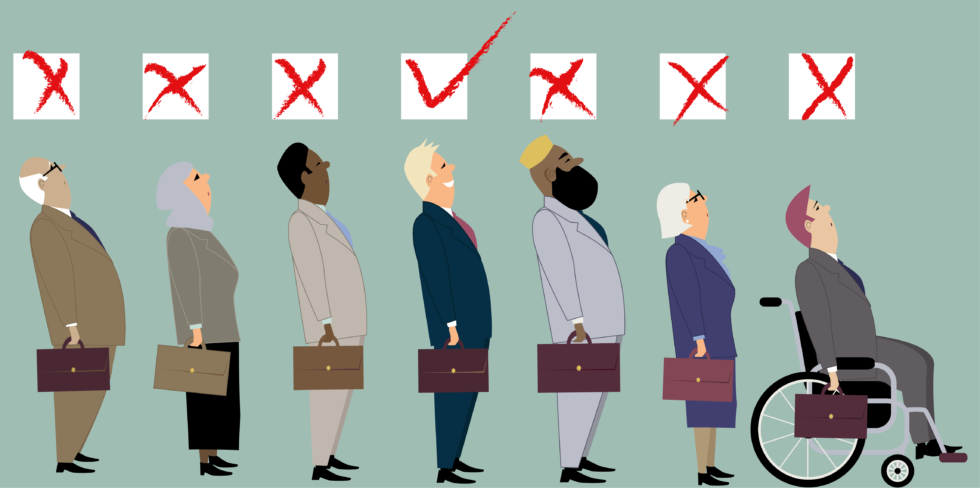
More than half of the Dutch have experienced discrimination during a job application process. About 40 percent have had such experiences in the workplace. The most frequently cited grounds for it are age and migration background. How does this happen and what can be done?
The market research firm Motivaction conducted research on behalf of Nationale Vacaturebank and Intermediair on experiences of discrimination in the workplace. Over 2,000 people were asked for this purpose including employers, employees and job applicants. 55% of respondents said they had encountered discrimination when sending a cover letter or email or registering for work. 53% said they experienced discrimination in general during a job interview. The same percentage reported having experienced discrimination based on age. 27% indicated that there was discrimination because of their migration background. Furthermore, respondents reported discrimination on (surname) (22%), gender (18%) and sexual orientation (3%).
Discriminatory jokes are occasionally made in the workplace, according to 56%. There still appears to be too little awareness about the role of discrimination in the labor market. Sharita Boon (Motivation) says: “Between what employers see and what employees say happens, there appears to be a big difference. The numbers show that it happens and yet not many will say they discriminate. But it has to come from somewhere. If it doesn’t happen to us ourselves, it’s easy to turn a blind eye to the problem.”
That labor market discrimination is not only an abstract phenomenon, but also experienced as very personal, shares Ruben Brave, entrepreneur and board member of the Dutch Startup Association (DSA), which is affiliated with Amsterdam – Diverse & Inclusive. Discrimination happens in so many different forms. Sometimes it is implicit, behind someone’s back, sometimes very explicit face-to-face. Brave has experienced both forms of discrimination as a board member of larger companies because of his Surinamese background. He always tried to remain professional and react very carefully to such incidents: “In my career, I always reacted so rationally to discrimination, no matter how bad or unfair it was. That was the only way I could limit the damage to myself. When I was told by a director that I had to leave the building immediately ‘because my color didn’t suit a shareholder,’ I remained calm.”
“When I didn’t get the agreed-upon funding for a start-up because my white business partner got out and this government organization ‘didn’t give such amounts to someone with my background,’ I looked at what I could do about it practically. In both cases, I later vindicated myself. But now I wonder: at what cost? What if someone after me has a similar discriminatory experience at this company because I didn’t speak out against what happened then? That’s why I want to tell about what I experienced.”
Ruben Brave, entrepreneur & DSA board member
The Knowledge Platform for Integration & Society (KIS) has collected a number of tips for employers to counter (unconscious) discrimination during the application process and in the workplace. A tip: Accountability (internal and external) pays off. When companies are regularly accountable to an independent organization for their recruitment and selection, there should be an opportunity to reward those companies for doing so: this is also known as “naming and faming. Are you as an organization serious about increasing diversity and inclusion in your organization and openly commit to it? Then consider the Diversity Charter.
